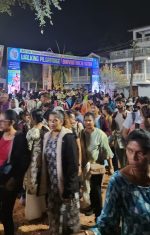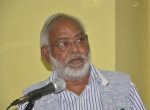By M K George
Rome, Jan 21, 2024: Is there anything common between Graham Staines, the Australian missionary burned to death by Bajrang Dal activists and the Ram Temple in Ayodhya? There was none. However, from January 22 there will be.
The day Staines and his two young sons were burned to death and the day Ram temple was inaugurated will be the same. Is this accidental or purposely done? One would not know easily. But this occasion calls for certain reflections and questions for every Indian citizen.
Lest we forget
For many today the name of Graham Staines may be strange and unknown. He was an Australian missionary who had worked silently for 35 years serving the poorest of the poor tribals and leprosy patients in Odisha. Allegations of conversion, which was part of the Hindutva project, were raised repeatedly.
It reached a pitch so feverish that a mob of men dared to burn Staines and his two young sons in the middle of the night of January 22, 1999. One of the cruelest acts in Indian history. Gladys Staines, the wife of the murdered evangelist, forgave the murderers and continued to serve the poor for five more years , before she returned to Australia in 2004.
Ram Temple
The feverish or almost hysterical preparations for the inauguration of the temple and accompanying controversies are not the matter for this reflection. Today, Ram Temple has become a passion for millions of Hindus and a rallying point for political mobilization.
Let that be. One should, however, continue to ask the question, how much of the fervor is manufactured, how much of it is natural?
The complex relationship between politics and religion gets more cofounding and incomprehensible for most ordinary people.
Two calls
I hear two calls for action on the part of every Indian citizen, particularly every religious believer on this day.
The first call is to protect the Constitutional assurance of keeping State and Religion independent. The Indian Constitution clearly says, that ‘before the State no religion shall be given preference over the other. Citizens are free to preach, practice and propagate any religion of their choice. The objective of this right is to sustain the principle of secularism in India.’
The court judgment on the murder of Staines affirmed the Constitutional assertion. “Our concept of secularism is that the State will have no religion. The State shall treat all religions and religious groups equally and with equal respect without in any manner interfering with their individual right of religion, faith and worship.”
The Court also said, “It is undisputed that there is no justification for interfering in someone’s belief by way of ‘use of force’, provocation, conversion, incitement or upon a flawed premise that one religion is better than the other.”
Sadly, we see this principle ignored and broken by the hour. How do we respond, as a responsible Indian Citizen?
The second call is to believers and adherents of religion. What kind of religion do you want to hold on to? What do you want religion to do really for people? Build more churches, temples, mosques?
There is an interesting poem by Rabindranath Tagore:
‘There is no God in the temple, says the Saint.
The angry King retorts, ‘There is no God! Oh! Saint, you talk like an atheist. The gleaning idol made with rare gems, sitting on the golden throne- Is that empty space?’
‘It is not empty, it is filled with royal hubris’, says the Saint.
‘You have installed yourself, Not the Master of the World’.
Believers in India have this bounden duty to ask themselves whether we need more churches, temples, mosques. In building up more concrete monstrosities in the name of devotion and religion, are the believers being true to God or religion?
According to St. James, ‘Religion that is pure and undefiled before God the Father is this: to visit orphans and widows in their affliction, and to keep oneself unstained from the world.’(1, 27).
Swami Vivekananda said, ‘To devote your life to the good of all and to the happiness of all is religion.’
January 22 should become a day of self-examination for all the citizens and believers of India.
(Father M K George is an Indian Jesuit social scientist based in Rome.)










